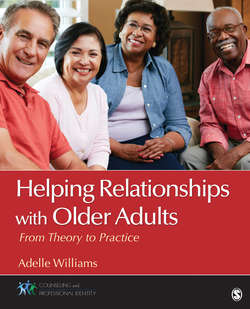Читать книгу Helping Relationships With Older Adults - Adelle M. Williams - Страница 30
На сайте Литреса книга снята с продажи.
Smell
ОглавлениеAs individuals age, the olfactory (smell) function declines. Not only is there a loss of sense of smell, but also a loss of ability to discriminate between smells (Boyce & Shone, 2006). More than 75% of people over the age of 80 years have evidence of major impairment in ability to smell, and smell declines considerably after the seventh decade (Boyce & Shone, 2006). A major consequence of the loss of smell could pose a threat to the health and well-being of the older persons and other individuals within the environment. For example, if an older adult does not know that the pot is burning on the stove, a fire could develop. An older person who is unable to smell a gas leak places himself or herself in danger and potentially others in close proximity. If the elder cannot smell the freshness of food in the refrigerator, which has now spoiled, they will consume harmful foods, which may lead to hospitalization for an illness. Older persons may become depressed at the changes they are experiencing, and a mental health professional can provide counseling and referral services to manage the depression. Mental health practitioners can also provide education and support services to facilitate a continued good quality of life for their clients while facilitating coping and adaptation to their environment.
Smell activity declines with aging. There is atrophy of olfactory bulb neurons, and central processing is altered. The result is decreased perception and less interest in food. Again, these age-related changes are compounded by disease. For example, Alzheimer’s disease (AD) and Parkinson’s disease (PD) are related to diminution and alteration of smell (Besdine & Wu, 2008). The ability to smell diminishes because the lining of the nose becomes thinner and drier and the nerve endings in the nose deteriorate. However, the change is slight, usually affecting only subtle and complex smells. Because of these changes, many foods tend to taste bitter, and foods with subtle smells may taste bland.
The olfactory nerves are also thought to have fewer cells functioning in older adults. Because the odor of foods stimulates salivation and hunger, a diminished sense of smell often contributes to a decreased appetite. A decreased sense of smell also leads to the inability to smell danger in the environment, such as leaking gas stove burners that are not completely turned off, and spoiled food. Older adults who live alone should develop the habits of checking all burners after use to be certain they are turned completely off and marking the date food is placed in the refrigerator to prevent eating spoiled food (Talbot & Hogstel, 2001). Changes in the ability to smell negatively impacts quality of life for older adults as does changes in sensation with aging.
